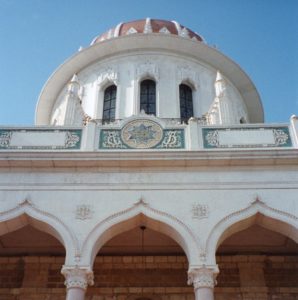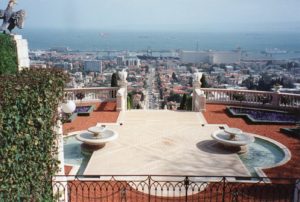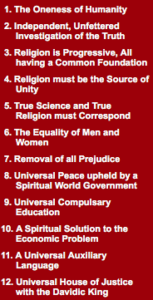*****
Now the Siyyid Báb had disposed all His affairs before setting out from Chihríq towards Tabríz, had placed His writings and even His ring and pen-case in a specially prepared box, put the key of the box in an envelope, and sent it by means of Mullá Báqir, who was one of His first associates, to Mullá ‘Abdu’l-Karím of Qazvín. This trust Mullá Báqir delivered over to Mullá ‘Abdu’l-Karím at Qum in presence of a numerous company. At the solicitations of those present he opened the lid of the box and said, “I am commanded to convey this trust to Bahá’u’lláh: more than this ask not of me, for I cannot tell you.” Importuned by the company, he produced a long epistle in blue, penned in the most graceful manner with the utmost delicacy and firmness in a beautiful minute shikastih hand, written in the shape of a man so closely that it would have been imagined that it was a single wash of ink on the paper. When they had read this epistle [they perceived that] He had produced three hundred and sixty derivatives from the word Bahá. Then Mullá ‘Abdu’l-Karím conveyed the trust to its destination.
Well, we must return to our original narrative. The Prime Minister issued a second order to his brother Mírzá Ḥasan Khán, the gist of which order was this: “Obtain a formal and explicit sentence from the learned doctors of Tabríz who are the firm support of the Church of Ja’far (upon him be peace) and the impregnable stronghold of the Shí‘ite faith; summon the Christian regiment of Urúmíyyih; suspend the Báb before all the people; and give orders for the regiment to fire a volley.”
Mírzá Ḥasan Khán summoned his chief of the farráshes, and gave him his instructions. They removed the Báb’s turban and sash which were the signs of His Siyyid-hood, brought Him with four of His followers to the barrack square of Tabríz, confined Him in a cell, and appointed forty of the Christian soldiers of Tabríz to guard Him.
Next day the chief of the farráshes delivered over the Báb and a young man named Áqá Muḥammad-‘Alí who was of a noble family of Tabríz to Sám Khán, colonel of the Christian regiment of Urúmíyyih, at the sentences of the learned divine Mullá Muḥammad of Mamaqán, of the second ecclesiastical authority Mullá Mírzá Báqir, and of the third ecclesiastical authority Mullá Murtadá-Qulí and others. An iron nail was hammered into the middle of the staircase of the very cell wherein they were imprisoned, and two ropes were hung down. By one rope the Báb was suspended and by the other rope Áqá Muḥammad-‘Alí, both being firmly bound in such wise that the head of that young man was on the Báb’s breast. The surrounding housetops billowed with teeming crowds. A regiment of soldiers ranged itself in three files. The first file fired; then the second file, and then the third file discharged volleys. From the fire of these volleys a mighty smoke was produced. When the smoke cleared away they saw that young man standing and the Báb seated by the side of His amanuensis Áqá Siyyid Ḥusayn in the very cell from the staircase of which they had suspended them. To neither one of them had the slightest injury resulted.
Sám Khán the Christian asked to be excused; the turn of service came to another regiment, and the chief of the farráshes withheld his hand. Áqá Ján Big of Khamsíh, colonel of the bodyguard, advanced; and they again bound the Báb together with that young man to the same nail. The Báb uttered certain words which those few who knew Persian understood, while the rest heard but the sound of His voice.
The colonel of the regiment appeared in person: and it was before noon on the twenty-eighth day of Sha’bán in the year [A.H.] one thousand two hundred and sixty-six. Suddenly he gave orders to fire. At this volley the bullets produced such an effect that the breasts [of the victims] were riddled, and their limbs were completely dissected, except their faces, which were but little marred.
Then they removed those two bodies from the square to the edge of the moat outside the city, and that night they remained by the edge of the moat. Next day the Russian consul came with an artist and took a picture of those two bodies in the posture wherein they had fallen at the edge of the moat.
On the second night at midnight the Bábís carried away the two bodies.
On the third day the people did not find the bodies, and some supposed that the wild beasts had devoured them, so that the doctors proclaimed from the summits of their pulpits saying, “The holy body of the immaculate Imám and that of the true Shí‘ite are preserved from the encroachments of beasts of prey and creeping things and wounds, but the body of this person have the wild beasts torn in pieces.” But after the fullest investigation and inquiry it hath been proved that when the Báb had dispersed all His writings and personal properties and it had become clear and evident from various signs that these events would shortly take place, therefore, on the second day of these events, Sulaymán Khán the son of Yaḥyá Khán, one of the nobles of Ádhirbáyján devoted to the Báb, arrived, and proceeded straightway to the house of the mayor of Tabríz. And since the mayor was an old friend, associate, and confidant of his; since, moreover, he was of the mystic temperament and did not entertain aversion or dislike for any sect, Sulaymán Khán divulged this secret to him saying, “Tonight I, with several others, will endeavor by every means and artifice to rescue the body. Even though it be not possible, come what may we will make an attack, and either attain our object or pour out our lives freely in this way.” “Such troubles,” answered the mayor, “are in no wise necessary.” He then sent one of his private servants named Ḥájí Alláh-Yár, who, by whatever means and proceedings it was, obtained the body without trouble or difficulty and handed it over to Ḥájí Sulaymán Khán. And when it was morning the sentinels, to excuse themselves, said that the wild beasts had devoured it. That night they sheltered the body in the workshop of a Bábí of Milán: next day they manufactured a box, placed it in the box, and left it as a trust. Afterwards, in accordance with instructions which arrived from Ṭihrán, they sent it away from Ádhirbáyján. And this transaction remained absolutely secret.
*****
Abdu’l-Baha’
Exc. from: A Traveler’s Narrative-Written to Illustrate the Episode of the Bab
The Shrine of the Bab, wherein His body was interred.
The view from the Shrine of the Bab.
The Principles Of The Faith For Which The Bab Gave His Life


